When Cecilio Acevedo decided to pack up the few possessions he had to his name in 1964 and migrate from Mexico City to Los Angeles, he brought an invaluable asset with him. Three years of experience working across different furniture shops in Mexico would allow him to open his own business, which he’s now run for 52 years.
A native of Zacatecas, Acevedo was 20 years old when he arrived in El Monte, bouncing around from one upholstery shop to the next before anything stuck. Although he only had a fifth-grade education to fall back on, Acevedo knew the ins and outs of running a business and after years of working and saving money, he had the means to open a store of his own.
In 1971, he founded Mission Furniture Manufacturing, a 7500-square-foot family-run shop that sits on Whittier Boulevard in the heart of East LA, which has sold hand-made furniture since its doors opened. His best sellers are traditional three-cushion sofas which have remained popular over the years. As the owner of the shop, Acevedo devoted his life to Mission Furniture, working long hours, making late-night deliveries after closing and working seven days a week — even today at the age of 80. This is the way he supports his family. Cecilio wears the same chevron-style mustache, curly hairstyle and glasses today that he did 50 years ago, making him recognizable in old photos. While passion has driven his success, Cecilio said that he credits the efforts of his now 50-year-old son and co-owner of the store, Steven, for the business’s longevity. His son has worked alongside him for decades and helps run the shop today. Steven resembles his father with a little more hair on his face and up top, nearly matching the silver-colored clean comb-back style of dad as well as the glasses.

Street view of Mission Furniture Manufacturing, which sits along Whittier Boulevard in East LA. Photo by Marcos Franco
“My son has really been very helpful. He’s loved the business since he was little and he used to come on weekends and spend time with me and would help as much as he could,” Cecilio said. “I remember one time I went to deliver a queen-size bed to some apartments, and he was probably about 11 years old and he was really trying hard to help me get it upstairs. So he’s another reason why I’m probably still here. I don’t want to take [this] away from him.”
Business slowdowns
Cecilio and Steven spend most of their time in the store, filling orders, building the next project and interacting with customers who walk in the door. However, the number of people coming into the shop has declined in recent years, making it difficult to stay afloat. At its peak in the 1980s and 1990s, there was enough business to employ 15 family members, including cousins, brothers, aunts and others. Today, there’s only enough consistent work for the two of them.
Back in the day, Mission Furniture made most of its profits during tax season, when federal returns meant people had extra cash on hand. But that’s changed over the years and owners can no longer depend on that spike in business to fill their rainy day fund, which Steven attributes to consumer disinterest in custom upholstery and the convenience of online shopping — something Mission Furniture doesn’t offer on their website. He also acknowledges the influx for furniture imports from China that flooded the market at the end of the millennium which were cheaper in price and quality— an enticing alternative for those on a budget. When all these factors start to weigh on finances, the uncertainty going forward makes owners grateful to still be in business.
“Fortunately, my father purchased the building back in the 1970s, so overhead is low compared to other [retail furniture chains],” Steven said. “If he hadn’t done that, we would have closed a long time ago because the rents are just too much for us to survive.”
Steven says that despite the reduction in business, he’s confident that Mission Furniture will push through this rough patch and the family legacy will continue, thanks to the loyalty of regular customers who spread the word to their loved ones.
“I think [the regulars are] really what it is. Our customers are used to the type of manufacturing that we do and it’s going to be hard for them to find that somewhere else, so as long as we have those customers coming back and making recommendations, I really don’t see why we couldn’t continue,” Steven said. “We recently helped the grandchildren of some longtime clients.”
Response to the pandemic
As if a business slowdown wasn’t bad enough, the pandemic rolled around and the father and son had a difficult decision to make; disregard strict business regulations and continue operations, or close the store and turn the page on a lifetime of work. The Acevedos told CALÓ NEWS that if they closed, Mission Furniture would ultimately suffer the same fate as many small businesses in the city did at the time, permanent closure. From early on, Los Angeles led the nation with the most business closures during the pandemic, half of which were permanent, according to Yelp’s 2020 Local Economic Impact Report.
Instead of locking up shop, the Acevedos decided to help the members of an already broken-down community by doing what they knew best, rolling up their sleeves and getting to work.

A framed photo collage from the mid-1970s that hangs on the wall near the business’s front desk.
“We saw a big need in the community. There were a lot of customers that we’ve been dealing with for years — I can think of two families in particular that lost their apartments and had to move in with family members,” Steven said. “They needed bunk beds; they needed mattresses to get everybody to fit in one smaller space, and I’ve never sold as many bunk beds as we did that year because it was just the need.”
The building’s history
Before Mission Furniture was founded, El Barrio Free Clinic, a small medical center that served underrepresented and low-income Latinos, stood in its place from 1968 to 1970. Although the clinic wasn’t around long, it had a significant impact on the community as it was run by Brown Beret leader Gloria Arellanes and volunteer healthcare workers to counter inequities affecting Latinos in the area, such as affordable healthcare. The building itself dates back to 1926 and and in 2018, was nominated by the Chicano Moratorium in LA County and the Latinos in 20th Century California to be on the National Register of Historic Places, according to an online registration form.
Struggles with security and safety
Along with other business owners on the boulevard, the Acevedos struggle with the lack of safety and security in the area. According to Steven, it’s common for cars and lunch trucks to park in the red or two-hour zones all day, blocking businesses from the street’s view. While being out of sight isn’t ideal for a store looking to attract customers, that’s far from their biggest concern. Mission Furniture was also burglarized earlier this year when someone broke in through the woodshop in February and stole tools from their workshop. Police response can often take an hour or longer, which ultimately means they need to take precautions and lean into the policing role themselves, the Acevedos told CALÓ NEWS.

A framed photo collage from the mid-1970s that hangs on the wall near the business’s front desk.
Despite any challenges, the Acevedos say that they love their community and are proud to have had a meaningful influence there for so long. Even though Cecilio has worked since he was a teenager in Mexico, even with more than six decades of work under his belt, he doesn’t have any plans on retiring in the near future. Whenever the time does come that he can no longer run the business, he hopes to pass his livelihood onto Steven.
Some may say that Cecilio’s identity is ingrained in the business since he’s spent most of his life working within its four walls. The work he does, building furniture that becomes a part of a person’s home for years, gives him a sense of fulfillment that far surpasses any desire for wealth.
“I haven’t gotten rich or anything like that, but I make a living and I’m happy with my work and I’ve enjoyed all this time working with people, trying to do the best I can as far as making good products that people have a use for,” Cecilio said.

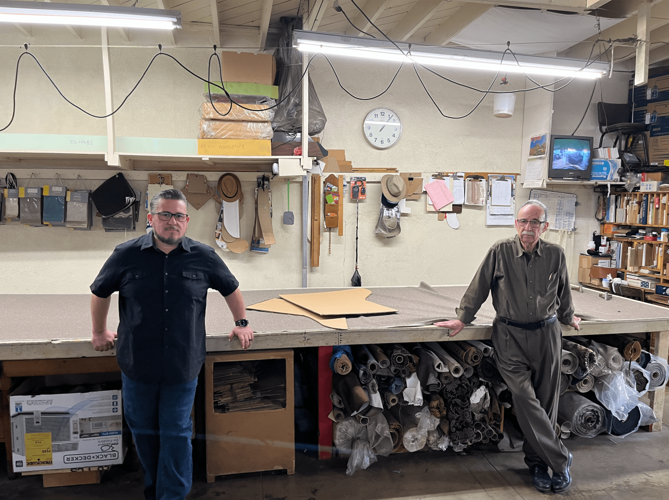
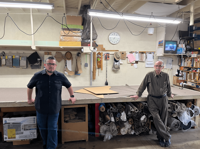

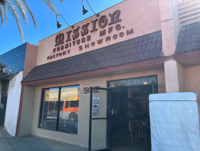

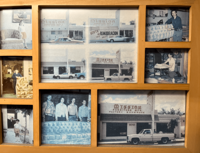
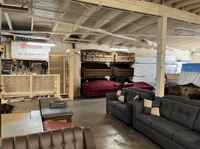
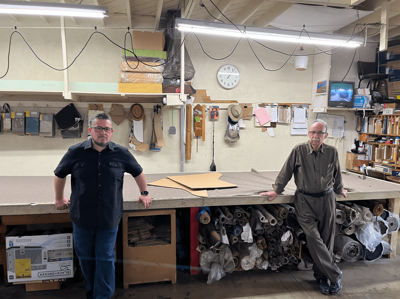

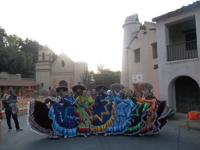

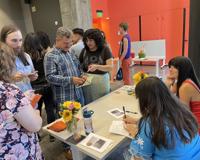

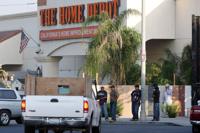


(0) comments
Welcome to the discussion.
Log In
Keep it Clean. Please avoid obscene, vulgar, lewd, racist or sexually-oriented language.
PLEASE TURN OFF YOUR CAPS LOCK.
Don't Threaten. Threats of harming another person will not be tolerated.
Be Truthful. Don't knowingly lie about anyone or anything.
Be Nice. No racism, sexism or any sort of -ism that is degrading to another person.
Be Proactive. Use the 'Report' link on each comment to let us know of abusive posts.
Share with Us. We'd love to hear eyewitness accounts, the history behind an article.